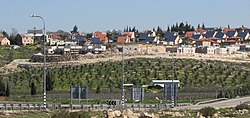Susya (Israeli settlement)
Susya
סוּסְיָא | |
|---|---|
 | |
| Coordinates: 31°23′31″N 35°6′44″E / 31.39194°N 35.11222°E | |
| District | Judea and Samaria Area |
| Council | Har Hevron |
| Region | West Bank |
| Affiliation | Amana |
| Founded | 1983 |
| Population (2022)[1] | 1,602 |
Susya (Hebrew: סוּסְיָא) is a religious communal Israeli settlement in Area C of the West Bank. Located near but not atop the ancient Jewish village and synagogue in the archaeological site of Susya, it falls under the jurisdiction of Har Hevron Regional Council. In 2022 it had a population of 1,602
The international community considers Israeli settlements in the West Bank illegal under international law, but the Israeli government disputes this.[2]
History
[edit]An Israeli settlement was established in the area of Susya between May and September 1983, on 1,800 dunams of land. It was expanded in late 1999 by installing 10 caravans on 4 dunams of land belonging to the Shreiteh family.[3] It had a population of 737 in 2006.[4][3][5] In 1985, the Susya Tourism and Education Center was established which offers tours and activities in the nearby archaeological site. The center has a hostel and a pool.[6][7]
In 2008, a large advanced goat pen and dairy, incorporated as Halav Ha'aretz, Susya Dairy Ltd., was inaugurated on Susya's lands with an investment of 3.5 million ILS. It produced goat yoghurt for the Israeli market from a herd of 1500 goats, 48 of which can be milked simultaneously.[8][9]
Many former Afrikaner Christians, after converting to Judaism, have settled in Susya, which has become a notable stronghold for their group.[10]
Israeli-Palestinian conflict
[edit]On 23 March 1993, Musa Suliman Abu Sabha, a Palestinian was arrested outside Susiya by two guards, Moshe Deutsch and Yair Har-Sinai, because they suspected he was planning an attack on Jews.[11] Taken for questioning, he stabbed in the shoulder or back one of the guards, Moshe Deutsch, while the two were in a car, and, wrestled to the ground, was bound hand and foot. Another settler from nearby Maal Hever, Yoram Shkolnik[12] shot him eight times, killing him.[11] According to the IDF he was found bearing a grenade, although the Baltimore Sun attributed assertions that, "the grenade had previously been removed from him" to unspecified "other sources.[13] Shkolnik was arrested and served seven and a half years in prison for murder.[14]
On 2 July 2001, the body of Yair Har-Sinai, a Jewish shepherd of 19 years from Susya who advocated pacifism was found shot in the head and chest by Muhammad Noor from nearby Khirbet Susya.[15][16]
One of three victims of the Fatah Al-Aqsa Martyrs' Brigades' Gush Etzion attack on October 16, 2005, a fifteen-year-old boy named Oz Ben-Meir (from Ma'on) is buried in the Susya Jewish cemetery in the southeastern portion of the settlement across Road 317 from the main housing section of this settlement. A friend and he were on their way to visit Jerusalem when he was killed.[17][18] According to the media, thousands attended his funeral and burial.[19]

References
[edit]- ^ "Regional Statistics". Israel Central Bureau of Statistics. Retrieved 21 March 2024.
- ^ "The Geneva Convention". BBC News. 10 December 2009. Retrieved 23 November 2011.
- ^ a b "Expanding the settlement of Susya". Applied Research Institute–Jerusalem. 18 September 1999. Archived from the original on 6 April 2012.
- ^ Unispal, "Israeli Settlements in Gaza and the West Bank (Including Jerusalem) Their Nature and Purpose, Part II" Archived 9 July 2015 at the Wayback Machine, United Nations, New York 1984.
- ^ אודות סוסיא Archived 22 March 2009 at the Wayback Machine
- ^ "Susya touring and education center". Eshkolot. Archived from the original on 2015-05-14.
- ^ "They also rebelled against Rome: chaos in Susya". Ynet. April 13, 2011.
- ^ "Azit, the settler goat". Maariv. February 6, 2008.
- ^ Akiva Eldar, https://www.haaretz.com/opinion/if-speaking-out-against-injustice-is-antisemitic-i-m-an-antisemite-1.10600450 'If Speaking Againstr Injustice Is Antisemitic, I'm an Antisemite,' Haaretz 9 February 2022
- ^ Judy Maltz, 'Cleansed by the Torah': Why These Afrikaners Converted to Judaism and Moved to Israel Haaretz 30 September 2021:'Like many Orthodox Jews, they also tend to be quite right-wing in their politics. It is no coincidence, then, that many have ended up living in West Bank settlements. Indeed, one of their main strongholds – aside from Ra'anana, which is popular among South African immigrants in general, and more recently the rural community of Yavne'el in northern Israel – is the settlement of Susya in the South Hebron Hills. . .Among the first Afrikaner converts to make aliyah were the Taljaards from Randfontein, a gold-mining city near Johannesburg. They came in the mid-1990s and began raising sheep in the settlement of Susya, where they were often involved in violent clashes with Palestinians from nearby villages in the South Hebron Hills. Jacob, the eldest of 14 children in the family, was killed in a tractor accident several years ago. He once famously told an Israeli television reporter that he “loved” the apartheid system and thought it was “the best thing in the world.”'
- ^ a b Associated Press, 'Jewish settler kills bound Palestinian,'[permanent dead link] Houston Chronicle, 23 March 1993 p.7, refers that Army radio had identified him to be a Jawad Jamil Khalil Husiya, 19, of Yatta.[dead link]
- ^ Ami Pedahzur, Jewish Terrorism in Israel, p.184.
- ^ Doug Struck, 'Jews react to slayings with bullets Cycle of reprisals claims another life,' at Baltimore Sun, March 24, 1993.
- ^ Singer, David; Grossman, Lawrence (2003). American Jewish Year. ISBN 9780874951172.
- ^ "Yair Har Sinai". Israel Ministry of Foreign Affairs. Retrieved 3 August 2015.
- ^ "The battle for the hills". Maariv. July 24, 2015.
- ^ Oz Ben-Meir Israeli Ministry of Foreign Affairs memorial
- ^ "Oz Ben-Meir, Haaretz News Service 10/17/2005". Archived from the original on 2017-02-11. Retrieved 2015-10-30.
- ^ Thousands Attend Funeral of Oz Ben Meir, News Briefs 10/17/2005, Tishrei 14, 5766 Reported 12:19 p.m.

